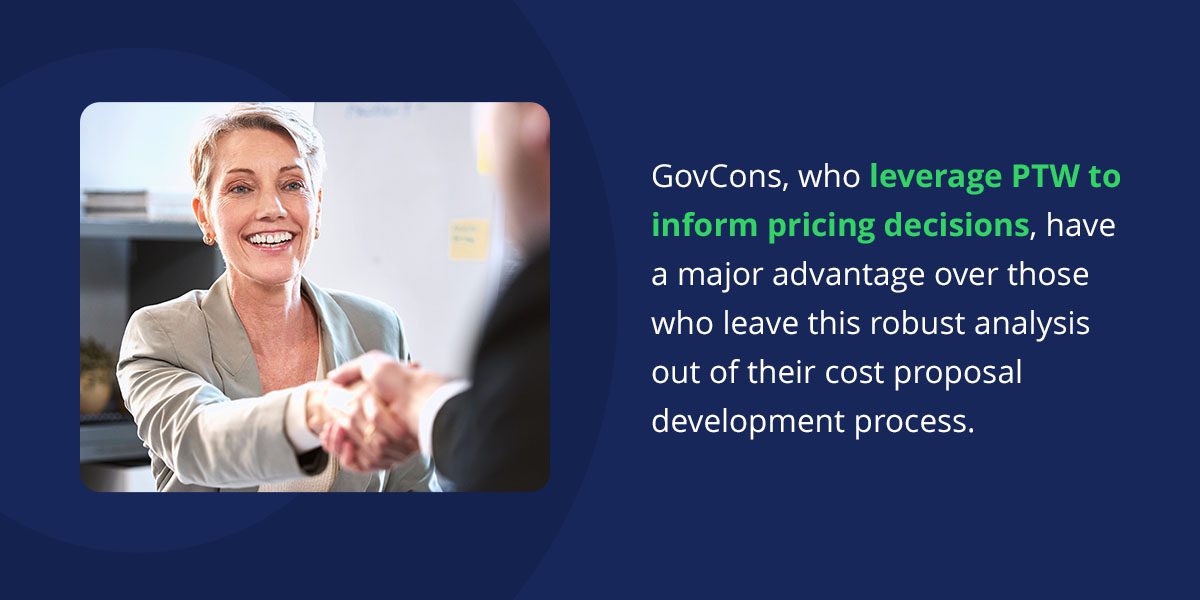Price to Win Strategies for 2025
Price to Win (PTW) is one of those phrases GovCon folks throw around without really understanding what it means. Some people hear the phrase and think there’s a winning number that guarantees them landing the next big contract if they find it. The truth is a little more complicated, but this guide will help you understand and leverage Price to Win strategies to solve your pricing problems and land federal contracts.
What Does Price to Win Mean?
PTW is a strategy for setting your price in a contract bid based on analyzing your competitors’ capabilities and evaluated prices. It aims to position your bid to win by offering better value for money than the competition.
In contrast to top-down Price to Compete analysis, PTW is a bottom-up build based on the draft and final Request for Proposal (RFP) documents. As soon as the draft RFP is out, PTW analysis starts from a Competitive Analysis to model rival solutions, what they’ll cost and how those contractors will price them.
PTW analysis should involve a comparison of labor categories, location and other components your competitors are pricing. The end result is the Total Evaluated Price (TEP). Along with the TEP, a thorough PTW analysis will recommend specific strategies from competitors to incorporate into your own pricing strategy.
How Does PTW Help Land Federal Contracts?
PTW helps GovCons land federal contracts by solving pricing problems and translating a Competitive Analysis into pricing to beat competing bids.
If you’ve been vying for contracts for a while, you’ve probably experienced pricing problems like:
- You’ve been losing proposals because of the pricing factors involved.
- Your technical and other volumes have been kicking down the door by getting excellent/good ratings, yet no wins.
Underneath these pricing problems is an analysis gap. PTW solves your pricing problems by filling that opening.
You achieve a winning price by thoroughly analyzing competition, acquisition trends, budgets, price and capabilities tradeoffs. You then balance applying your findings from this analysis with accurate cost proposal development. This process is essentially the concept of “Price to Win.”

GovCons, who leverage PTW to inform pricing decisions, have a major advantage over those who leave this robust analysis out of their cost proposal development process.
PTW Strategy Tips for GovCons
A Price to Win strategy’s result depends on how well you execute it. Here are four tips to help you price to win government contracts:
- Start early: A PTW process should begin the minute you identify an opportunity, and you should integrate it into your bid/no bid decision.
- Stay ahead: Understand the competitive landscape when the opportunity is announced and forecast what it’s likely to be by the time the final Request for Proposal (RFP) drops — this can be quite a long time, up to a year or two. Keep an eye on the ball because our industry’s landscape shifts constantly. A competitor may become your teammate, or a teammate might suddenly become a competitor if there is merger and acquisitions (M&A) activity.
- Sustain profitability: Armed with the data from your PTW analysis, weigh the likelihood of winning with a certain price against the reward if you do win. Look for a sweet spot between competitive pricing and worthwhile profits. Sometimes, the best conclusion to draw from a PTW analysis is to pass on the contract and focus on a better one.
- Source expertise: Hiring industry experts provides the lens needed for a robust view of the competition. A GovCon pricing expert will have a finger on the market’s pulse and access to data your internal team lacks. It’s worth investing in these experts to capture your PTW market analysis with an unbiased view.
Contact BOOST LLC for Pricing Solutions
Winning a federal contract bid demands more than the right technical solution — it requires pricing that fits the project budget and beats out your competitors. On a competitive landscape where rewards are high and wrong pricing calls leave you empty-handed, GovCons must leverage superior analysis for superior results. BOOST is your resource for pricing advantage for your next contract bid.
The dedicated pricing team at BOOST has the experience, expertise and resources you need to gain a competitive pricing advantage. Our Price to Win consulting service for GovCons will capture the accurate analysis you need to price your bid for the win. Our seasoned pricing buffs will help you gain key pricing insights and incorporate them into winning cost volumes.
Contact BOOST to schedule an appointment and give your bid the pricing edge it needs.
““





